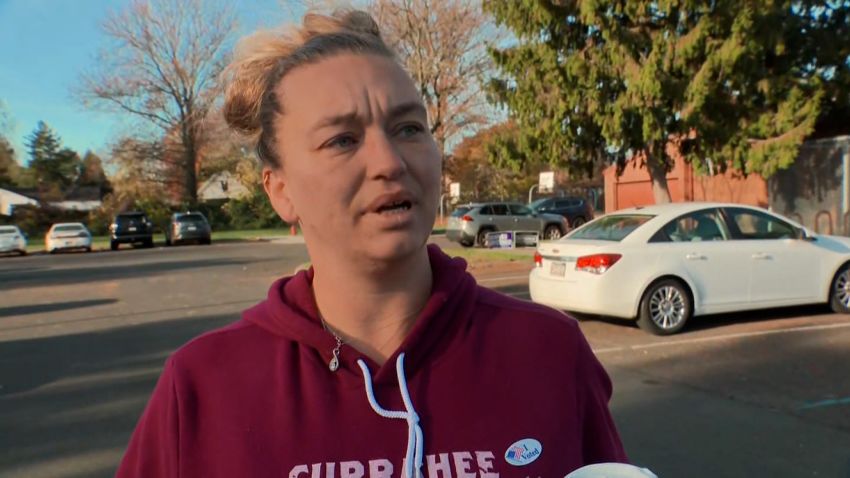Editor’s Note: Mary Ziegler is the Martin Luther King Professor of Law at UC Davis and author of the book “Dollars for Life: The Anti-Abortion Movement and the Fall of the Republican Establishment.” The views expressed here are her own. Read more opinion on CNN.
For the past several weeks, pundits warned that Democrats had peaked too early. True, Americans did not like the Supreme Court’s decision this summer to reverse Roe v. Wade and destroy abortion rights. But we were all told that June was a long time ago. Other issues were now front of mind, and the old truths that have always defined American abortion politics hadn’t changed: Most Americans want abortion to be legal, but it won’t sway their vote.

After Tuesday’s midterm elections, the outlook looks a bit different. The abortion-rights side seemingly went a perfect five-for-five when it came to ballot initiatives, recognizing a state right to abortion in Michigan, California and Vermont. Kentucky, a deep red state, turned away an attempt to say that the state constitution did not protect a right to abortion. Montana’s abortion measure, which threatened to impose criminal penalties on health care providers, was rejected by voters in Tuesday’s referendum. Abortion ranked second on the list of voters’ top issues and led the way for Democrats.
This summer’s Dobbs decision is hardly a magic bullet for Democrats, who still seem likely to lose control of the House of Representatives and may, depending on the outcome of three outstanding races, ultimately cede the Senate too. But despite those outcomes, the midterm shows a clear path forward for supporters of abortion rights: If a ballot initiative can win in Kansas or Kentucky, almost any place is fair game.
But can Democrats really manage the same feat across the country? There are clear limits to this plan of attack. It’s much harder to get a proposal before voters in certain key states like Virginia, Wisconsin, Texas and Louisiana. And voters in conservative states have not become full-blown supporters of reproductive rights overnight. If Kentuckians had been asked to vote for a constitutional abortion right, their answer may be different than the one we heard Tuesday night.
Perhaps the biggest wild card is Dobbs itself. Not what the decision said – that has been baked in since May, when a draft leaked from the court and then went fundamentally unchanged before the Supreme Court reversed Roe in June. What we don’t know is what Dobbs will mean in the lives of Americans.
Midterm voters were certainly reacting to what the Supreme Court did. There is no real precedent for the court to destroy what was long recognized as a constitutional right – much less to do so in a way that was mocking and dismissive. In his opinion for the court, Justice Samuel Alito observed that more than half the electorate was female. If people didn’t like what the court had done, he suggested, they could just go out and vote. Last night, voters certainly took Alito’s advice.
But they were not just reacting to what the court wrote. They were also responding to what legislators were making Dobbs mean on the ground.
More than a dozen states implemented trigger laws that banned all abortions, most without exceptions for rape or incest; others revived 19th century laws that barred almost all abortions. State laws made it harder for physicians to defend themselves when they intervened in cases of medical emergency, narrowing the kind of health threats to which physicians could respond or requiring physicians, rather than prosecutors, to prove that they needed to save a patient’s life.
None of this was likely to be popular. Even most Republicans support exceptions for rape, incest and health. So far, Dobbs has seemed to mean bans on abortion that go further than most voters want. It’s not surprising to see some backlash to that.
And some state lawmakers want to go even further. In Texas, legislators have threatened the CEOs of major corporations with felony charges for reimbursing their employees for traveling out of state for abortion. The Idaho Republican platform includes no exceptions for abortion at all.
Self-proclaimed abortion abolitionists are pushing lawmakers to consider bills that would punish pregnant patients for abortion. More than one anti-abortion group has floated the idea of preventing travel for abortion – either by allowing people to sue anyone who travels out of state, using the model developed under Texas’s SB8 – or applying a red state’s criminal abortion law to anyone who helps a person from that state get an abortion, even if that procedure was perfectly legal where it took place.
Voters are already making their voices heard about Dobbs, but Republicans may just be getting started. True, some may think better of doing much on abortion after Tuesday’s results. But for many state lawmakers with uncompetitive seats, abortion bans remain good politics, and their decisions could define Dobbs in the years to come.
And those are just the concrete consequences. But Americans’ reactions to Roe v. Wade over the past five decades were about much more than what the Supreme Court said in 1973. For a wide variety of movements and individual Americans, Roe became a symbol: for equality for women, for judicial overreaching, or even for a broad idea of reproductive justice.
The same could happen to Dobbs. What we now see as a decision that ended a federal guarantee for abortion rights could eventually be a symbol of a Supreme Court that is indifferent to public opinion, or the beginning of the end for many of our rights to privacy.
So when someone tells you abortion doesn’t matter to voters, don’t listen. But how much it matters – and whether that’s enough to make wins for abortion rights possible in states well beyond Michigan and Kentucky – is a tougher question. That’s because the Supreme Court doesn’t get the last word on what Dobbs means. That’s up to the rest of us.






